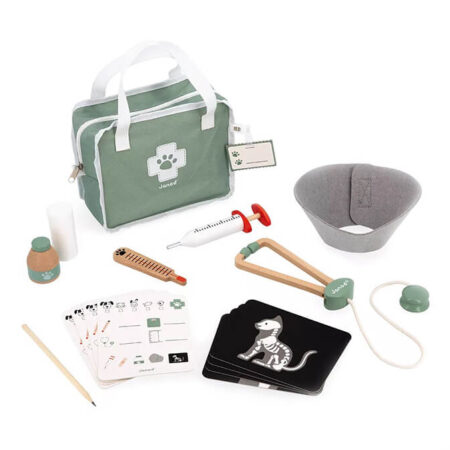
Pretend Play
Showing 37–38 of 38 results
Children’s Wooden Role-Play Toys
Looking for the best role-play toys for children? Here at Wood Bee Nice, we know the importance of pretend play for developing social and thinking skills.
That’s why we’ve selected sustainable wooden play toys from top-rated brands like Le Toy Van, Hape, Classic World, Djeco and more! In addition, our pretend play toys are available in various sizes, shapes and colours to inspire children of all ages!
What is Pretend Play?
Pretend play, AKA role-play and imaginative play, allows children to create their own world of fun without the need for structured activities or games.
Some examples of pretend play are:
- Wooden toy kitchens and cookers for toddlers and children to imitate grown-ups while exploring different foods and utensils while feeding friends, dolls and teddy bears.
- Work Benches let little hands get to work using the wooden play tools and chalkboards. They can imitate grown-ups and feel a sense of accomplishment. It’s also perfect for role-playing with other children to strengthen social skills.
- Dolls prams, pushchairs and nursing sets are the essence of pretend play. Little ones can pretend to be grown-ups taking care of dolls and making sure they have everything ready for babies needs.
What are the Benefits of Role-Play for Children
Imaginative play is how young children come to learn about the world and themselves. Early learning is filled with fantasy and creativity. It is the perfect opportunity for little ones to master essential skills like imagination, social and emotional regulation.
Here are a few more advantages of pretend-play in childhood development:
- Develops imagination and helps children to think for themselves
- Deepens empathy skills by learning to walk in other’s shoes
- Ability to practice social skills and prepare for life’s emotional rollercoaster
- Boost self-esteem by creating a happy inner and outer world
- Self-awareness and noticing others’ feelings around them during role-play
- Improve communication skills while expanding vocabulary
- Decreases anxiety as they make sense of the world around them
- Mastering emotional regulation during pretend play when things don’t go as planned
- Sharpens memory when imaginative play requires problem-solving skills
- Refines motor skills when using role-play toys
- Enhances physical development
How can Parents Encourage Pretend Play?
In one day, children can be a chef, a magnificent knight or even practice cleaning their room!
Children love to imitate the grown-ups around them. So, playing face to face with little ones enables them to copy facial expressions and gestures, which adds to their future social skills.
It’s essential to follow your children’s lead when role-playing. This allows them to feel in control which helps self-esteem and confidence to blossom.
Little ones thrive on repetition – especially during fun role-play games! So, provide them with wooden pretend play sets and always keep it simple.
Choosing the right toys will enhance their role play experience. Wood Bee Nice have a lovely collection of sustainable and educational wooden toys for pretend play. So, discover our full range of pretend play houses, wooden toy telephones, and role-play Montessori accessories.
FAQs
What are the best role play toys for children’s pretend play?
There is an endless choice of role-play toys. Some favourites are career-based role-play toys such as a wooden toy workbench or a food preparation set. Or, children can get lost in imaginative worlds with wooden tea sets, creating tea parties for friends or in a tipi pretending to be Indians.
At what age do children stop pretending play?
Children tend to grow out of role-playing games at around 12. This is because they’re more integrated into reality and want to focus on school, sports and friendships.
What is the difference between pretend play and role play?
Role-play and pretend play mean the same thing. It can also be described as imaginative play or symbolic play.


